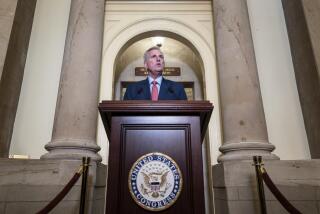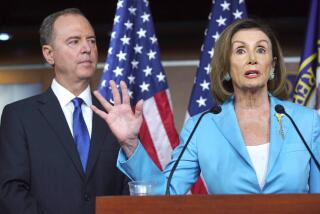Clinton Puts His Faith in History
- Share via
WASHINGTON — An unexpectedly cheery President Clinton told guests at a holiday party Sunday night that he is reconciled to his impeachment and confident that history will vindicate him.
Despite his overall good humor, a worried look briefly crossed his face when he said that the Senate stage of the process remains “unpredictable.” Joking that negotiating peace in Northern Ireland seemed easier than trying to “pry” a resolution of censure out of congressional Republicans, Clinton said he is determined to find a quick way out of the crisis but remains stumped about how to do it.
Clinton made the remarks at a function for friends and supporters in the elaborately decorated White House State Dining Room one day after the historic impeachment vote by the House of Representatives. Although Clinton has shunned interviews for most of the year, he spoke at length with a Times reporter, who had been invited by one of Clinton’s friends.
He talked about Iraq. He talked about Israel. And, like a baseball fan analyzing box scores, he talked about the political landscape in the districts of the moderate Republicans who cast the decisive votes for impeachment. Rep. Rick Lazio (R-N.Y.), who voted with the Republican majority for two of the four articles of impeachment, faces a tough primary if he runs for the Senate in 2000, Clinton said. Rep. Constance A. Morella (R-Md.), who broke ranks with her party and voted against impeachment, is from a heavily Democratic district, he noted.
Perhaps the most fascinating aspect of the conversation was the glimpse Clinton provided into his mind-set as he comes to terms with being the second president in history to be impeached.
Asked how it felt to have been impeached, he replied: “Not bad,” and went on to say that within 10 or 20 years he believes he will be on the right side of history, that historians will not give undue weight to impeachment when they analyze his presidency.
Clinton Mentions Past, Evaluates Present
Noting that attacking an adversary’s alleged personal failings is not a new tactic in American politics, Clinton told the story of how Abraham Lincoln had addressed the topic in the very room where Clinton was standing with his friends.
Responding to criticism that Gen. Ulysses S. Grant drank too much, Lincoln said of his successful general, “Whatever he’s drinking, make sure the other generals get some too.” Clinton recounted the story with a laugh.
Surrounded by a small cluster of friends from childhood and college--who were gloomy and distraught over efforts to drive Clinton out of the White House--the president regaled them with anecdotes about how he has made it though a tumultuous and painful year.
The best advice anyone gave him all year, he said, came from Anthony Mangun, a Pentecostal minister from Alexandria, La., who came to the White House to see him in January, not long after the story broke of the president’s affair with former intern Monica S. Lewinsky.
The minister, who has known the president for two decades, first told Clinton that he loved him no matter what he had done.
Mangun told Clinton that, although he would not call those who were attacking the president “evil,” they were acting out of a “dark” impulse. The minister advised Clinton that he must be “light” and warned him not to “fight directly” against his adversaries, because when light mixes with darkness, everything becomes gray.
Not long after the president told this story, Mangun, who was a guest at the party, approached Clinton, hugged him and wished him Merry Christmas. As if on cue, Mangun told the group of friends gathered around the president to do the “fighting,” while he and the president do the “praying.”
The president told his guests that former House Speaker Jim Wright (D-Texas) had given him another helpful insight. Wright, who resigned under pressure as House speaker in 1989, told Clinton that resigning would not be likely to calm the political tempests or stop character assassination.
Wright, who was accused of improper financial dealings, had insisted on his own innocence and had called for an end to a “period of mindless cannibalism.”
In a telephone interview, Wright said that he had met with Clinton in Washington, talked to him by phone and written to him in the last year. “I have been disappointed that my [own] act of resignation did not seem to have the beneficial effect I had hoped it would, and I did express that fact to President Clinton,” he said.
The president said that he has purposely and frequently “purged” himself of the anger he feels toward his attackers, because he knows that anyone who harbors hatred pays a price for it.
And he said that South African President Nelson Mandela, who spent three decades as a political prisoner, taught him to turn the other cheek.
During Mandela’s first state visit to Washington, Clinton asked him how he managed not to hold grudges against his former captors, who had imprisoned him for working to change South Africa’s policy of apartheid. Mandela told Clinton that, as he left prison and walked toward freedom, he realized that he would not be free if he took his anger with him.
Mandela Holds Onto His Heart, Mind
Years earlier, Clinton related, Mandela had learned to control his anger at his captors. As he hammered limestone in the prison quarry, Mandela thought about how much had been taken from him: his youth, his relationship with his wife and his keen eyesight. The only things that were still his, he realized, were his mind and his heart. And he was determined not to give either to his adversaries by hating them, the president said.
Whenever Mandela has checked in on Clinton over this last difficult year, he has urged him not to give his adversaries his heart or his mind, Clinton said.
And when South African Deputy President Thabo Mbeki visited Clinton on Aug. 5 in the Oval Office, he told him: “I have a question from my president. ‘Did you give [your heart or mind] to them?’ ”
The advice from Mandela and Mangun may explain in part why Clinton did not personally engage more directly in the battle against impeachment, the president said.
But Clinton said he was also well aware of the mathematics of public opinion polls. Clinton explained that his high approval ratings are contingent on the American public’s perception that he is doing his job. As soon as he stops to run his own defense rather than do the work of the presidency, his popular support will plummet, he said.
That is why he went to the Middle East, he said, losing valuable time to lobby moderate Republicans.
His biggest mistake, Clinton said, was in failing to press moderate Republicans to publicly declare their intention to vote against impeachment in the weeks immediately after the election, when they were feeling pressure from pro-Clinton voters in their districts more keenly than from conservative GOP colleagues.
But Clinton did not seem dispirited or disheartened. He laughed about the fact that Larry Flynt, publisher of Hustler magazine, had become the latest influence on the Washington political debate.
Information gathered by Hustler forced Rep. Bob Livingston (R-La.) to admit that he had numerous extramarital affairs. Livingston later announced that he would not serve as House speaker, as he had been scheduled to do next session, and would resign from Congress.
Clinton regaled his listeners with a description of a letter that Flynt wrote to independent counsel Kenneth W. Starr--whose investigation of Clinton’s affair with Lewinsky led to his impeachment--congratulating Starr for aiding the cause of pornography.
In response to encouraging words at the party from friends about whether he should resist calls for his resignation, Clinton stressed that it had not even “crossed my mind.”
* IMPEACHMENT STANCES: Amid a call for compromise, Clinton’s lawyers build defense. Senators air views. A26
More to Read
Get the L.A. Times Politics newsletter
Deeply reported insights into legislation, politics and policy from Sacramento, Washington and beyond. In your inbox twice per week.
You may occasionally receive promotional content from the Los Angeles Times.










